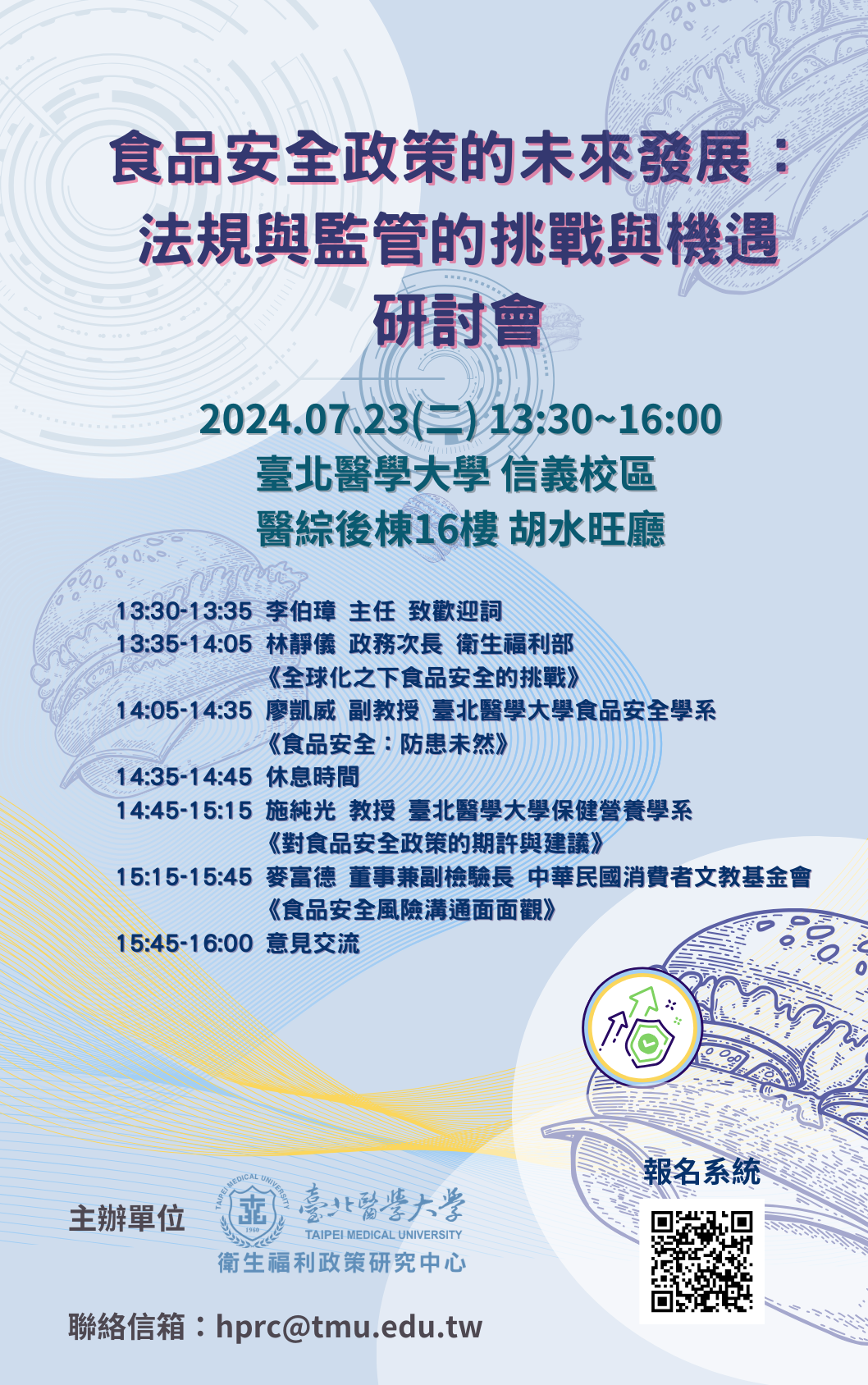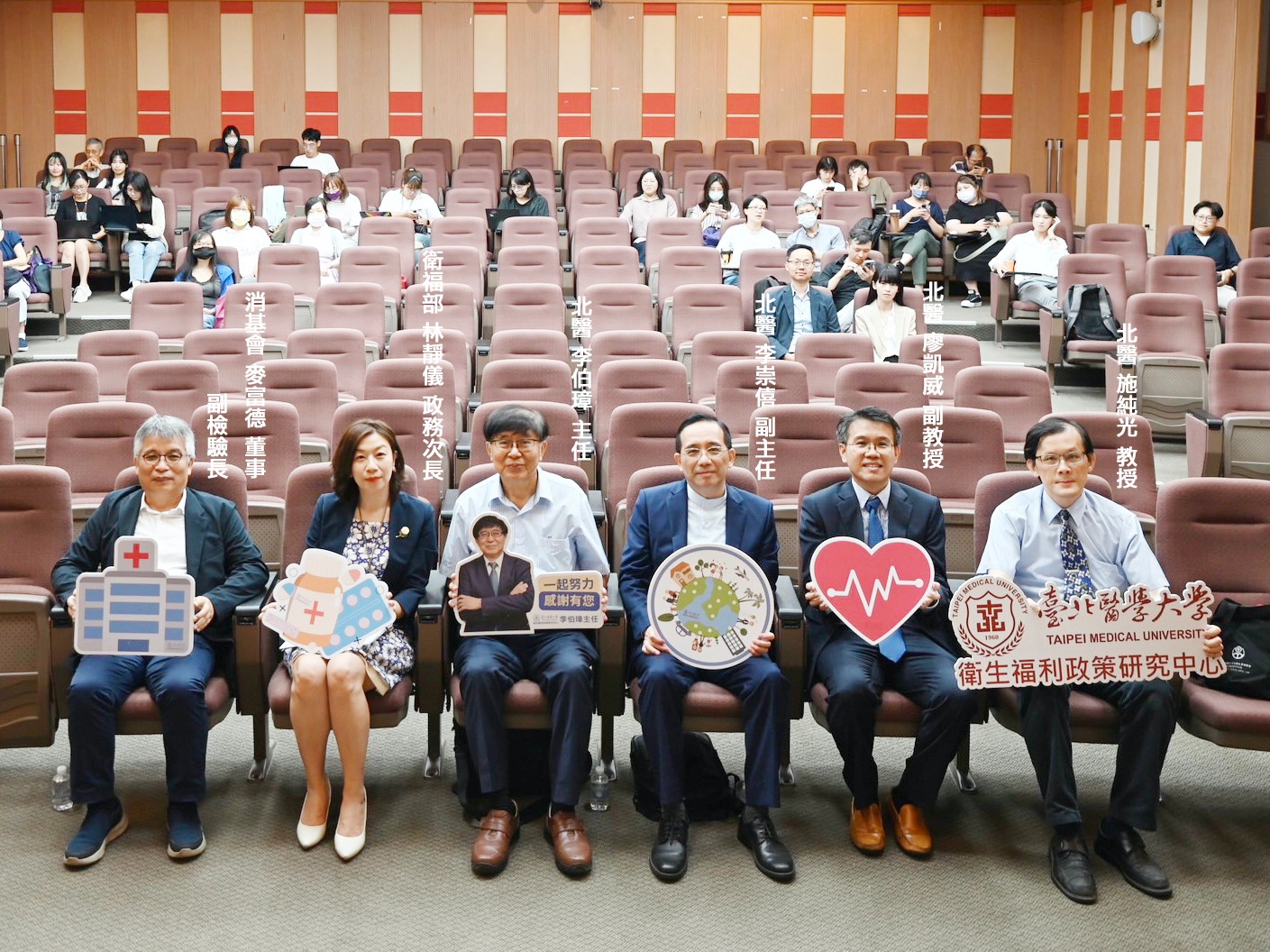活動名稱
Seminar on “The Future Development of Food Safety Policies: Challenges and Opportunities in Regulations and Supervision”

Seminar on “The Future Development of Food Safety Policies: Challenges and Opportunities in Regulations and Supervision”
【2024/07/23】

Taipei Medical University Hosts Seminar on “The Future Development of Food Safety Policy: Challenges and Opportunities in Regulation and Supervision” Bringing Experts Together to Discuss New Directions in Food Safety Policy
On July 23, 2024, the Center for Health and Welfare Policy at Taipei Medical University hosted an academic seminar titled “The Future Development of Food Safety Policy: Challenges and Opportunities in Regulation and Supervision.” The conference aimed to delve into the diverse challenges currently facing food safety policies and strive to build a more proactive and comprehensive policy framework to address emerging food safety issues. The seminar covered various fields, including food safety and public health, with several scholars and experts invited, such as Deputy Minister of Health and Welfare Lin Jingyi, Associate Professor of the Department of Food Safety at Taipei Medical University Liao Kaiwei, Professor of the Department of Health and Nutrition at Taipei Medical University Shi Chunguang, and Board Director and Deputy Chief Inspector of the Consumers’ Foundation, R.O.C., Mai Fude.
Director Lee Bochang Urges Multi-party Cooperation to Restore Confidence in Food Safety and Create a Healthy Eating Environment
Lee Bochang, Director of the Center for Health and Welfare Policy at Taipei Medical University, delivered a welcome speech. He urged the government to strengthen food safety supervision and improve relevant regulations. He also emphasized the importance of business ethics and integrity in the food industry. Lee stated that only by maintaining hope, mutual trust, and taking proactive actions can society as a whole construct a reliable and trustworthy food safety system.
Deputy Minister Lin Jingyi: Multiple Challenges to Food Safety in the Era of Globalization and Interdepartmental Cooperation
Deputy Minister of Health and Welfare Lin Jingyi discussed the multiple challenges facing food safety in the current era of globalization and proposed corresponding strategies and future outlooks. Deputy Minister Lin stressed that food safety management is a comprehensive process from farm to table. The Ministry of Health and Welfare ensures the effective implementation of food safety policies and systems through interdepartmental coordination mechanisms, integrating platforms such as the Executive Yuan’s Food Safety Conference and the Environmental Protection and Food Safety Coordination Conference.
Challenges Brought by Globalization
Response Strategies and Future Prospects
To address these challenges, the Ministry of Health and Welfare has proposed a series of response strategies. First, the ministry will enhance the intelligent detection and prevention capabilities of food safety risks through big data analysis and artificial intelligence technology. Second, they will revise relevant regulatory standards to ensure they are up-to-date and aligned with international standards. Meanwhile, they will strengthen food safety education and public engagement to increase consumer awareness of food safety.
The Ministry will also promote food safety through multiple channels, such as using Line, Instagram, and Facebook, to enhance communication with the public and ensure the accurate transmission of food safety information. For the challenges posed by emerging technologies and business models, the Ministry will continue researching and formulating corresponding standards and policies to perfect the food safety management system.
In conclusion, Deputy Minister Lin called for government, industry, academia, and consumers to work together to build a sound food safety management system, ensuring public health and food safety in the era of globalization.
Associate Professor Liao Kaiwei Emphasizes the Importance of Comprehensive Collaboration in Food Safety Risk Management
Associate Professor Liao Kaiwei of the Department of Food Safety at Taipei Medical University cited World Health Organization (WHO) data, stating that approximately one in ten people worldwide fall ill due to food contamination each year, with 40% of foodborne illnesses occurring in children under five. He noted that more than 200 diseases are caused by consuming contaminated food. Professor Liao further elaborated on the main causes of foodborne illnesses, including:
Professor Liao emphasized that general consumers are most concerned about food safety issues and news. Since the 2011 plasticizer incident, public concern about food safety has gradually increased. Plasticizers, besides food, are also added to cosmetics, perfumes, and other products, putting Taiwanese people at a higher risk of exposure to these chemicals than in other countries.
He suggested that Taiwan should follow the research approach of the German Food Research Institute in food testing and procurement. The National Health and Nutrition Examination Survey (NHANES) in the United States regularly collects urine and blood samples from the public and periodically publishes reports to establish exposure standards, allowing for immediate tracing of contamination sources to ensure food safety.
Regarding student education, Professor Liao proposed plans to train professionals, enabling businesses to be supervised and awarded certifications to ensure food safety. Risk communication is often revealed by the media, and Professor Liao hoped the media could convey correct knowledge to the general public, improving overall food safety awareness.
Additionally, Professor Liao mentioned the “Taipei Medical University Food Safety Guardian Team” program. Since its establishment in September 2017, the program has been dedicated to creating a safe food environment on and around the campus through industry-academia cooperation. It has trained hundreds of students and provided professional guidance to hundreds of catering businesses. The latest SAFE (Stay Away From EDCs) project focuses on endocrine-disrupting chemicals (EDCs), including guidance and certification for businesses, advocacy for campus and surrounding stores, student training, and public education, among other collaborative measures.
Through these measures, Professor Liao hopes to establish a comprehensive and effective food safety protection network to safeguard the dietary health of the Taiwanese people and address the challenges of food safety in the era of globalization.
Professor Shi Chunguang Analyzes the Importance of Public Supervision in Food Safety: Everyone Is Responsible for Food Safety
Professor Shi Chunguang of the Department of Health and Nutrition at Taipei Medical University analyzed data from the Food and Drug Administration of the Ministry of Health and Welfare, indicating that bacterial food poisoning cases are the most frequent among identified causes of food poisoning in Taiwan, with the catering industry being the most commonly involved food category. This phenomenon highlights the urgent need to strengthen food hygiene management and enhance the professional quality of catering staff. Regarding the current “Five Rings of Food Safety” policy, Professor Shi pointed out several key issues:
To address these challenges, Professor Shi provided relevant response suggestions:
Professor Shi particularly emphasized that food safety should be regarded as a core issue of sustainable development and public health. He suggested incorporating food safety policies into the work scope of the National Council for Sustainable Development, the National Security Council, and the Health Promotion Administration to ensure that this critical issue receives comprehensive and sustained attention.
Director/Vice Chief Inspector Mai Fude Advocates for Multi-stakeholder Collaboration to Build a Safe and Reliable Food Supply Chain
Board Director and Deputy Chief Inspector Mai Fude of the Consumers’ Foundation, R.O.C., elaborated on the diverse and complex nature of current food safety issues, emphasizing that building a safe and reliable food supply system requires collaborative efforts from government departments, industry, academia, and civil society.
Director Mai pointed out that food safety risks involve multidimensional contamination factors, including biological, chemical, and radioactive elements. He cited a series of food safety incidents in Taiwan in recent years as case studies, including the recent poisoning incident at Baolin Teahouse (biological contamination), excessive pesticide residues in food raw materials, excessive heavy metals in farmland (chemical contamination), plasticizers (radioactive contamination), and illegal use of poisonous starch and gutter oil, highlighting the necessity of full-process supervision in food manufacturing. To improve the current situation, Director Mai proposed several strategic frameworks:
He further called for food safety as an issue related to public health and social security, hoping that all parties can work on clear division of labor and cooperation based on scientific evidence, the precautionary principle, and information transparency. Only through a multi-stakeholder collaboration mechanism can a safe and reliable dietary environment be built for consumers, while at the same time enhancing the credibility of the overall food supply chain and realizing a stable food safety management system.

 【2024/10/23】Ministry of Health and Welfare Project – Establishment of...
【2024/10/23】Ministry of Health and Welfare Project – Establishment of...